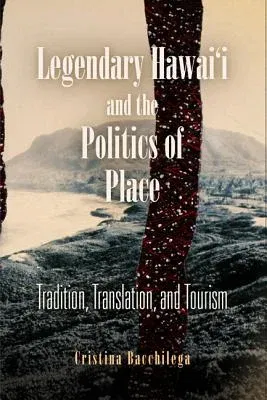Legendary Hawai'i and the Politics of Place Tradition, Translation, and
Tourism Cristina Bacchilega Winner of the 2007 Chicago Folklore Prize
"Legendary Hawai'i is insightful, provocative, and thought-provoking.
It forcefully illuminates the implications of tourism for a culture, and
the ways in which seemingly simple transactions, such as a tourist
brochure to bring tourists and dollars to the island, can work in
insidious ways to actually undermine the very people it seems to be
celebrating."--Journal of Folklore Research "Legendary Hawai'i and
the Politics of Place is an examination of cultural change through
textual analysis, and within those boundaries it accomplishes quite a
bit. . . . Bacchilega's close reading of texts and her nuanced
explications of photographs are persuasive and reach important
conclusions about cultural changes occurring in Hawaii, which may also
apply to other colonized regions."--Journal of American History "A
work of vigilant scholarship and elegant exposition that unsettles
long-taken-for-granted genres, modes of representation, narrative codes
and ascribed roles."--Hawaiian Journal of History "A fascinating,
carefully researched, and accessible look at how indigenous Hawaiian
stories were appropriated by non-Hawaiian scholars and writers and used
to promote a 'legendary Hawai'i' that misrepresents Hawai'i and its
indigenous people and their ways of viewing reality. The book is written
with passion and commitment and restores to the original stories and
their creators/tellers their true mana."--Albert Wendt Hawaiian
legends figure greatly in the image of tropical paradise that has come
to represent Hawai'i in popular imagination. But what are we buying into
when we read these stories as texts in English-language translations?
Cristina Bacchilega poses this question in her examination of the way
these stories have been adapted to produce a legendary Hawai'i primarily
for non-Hawaiian readers or other audiences. With an understanding of
tradition that foregrounds history and change, Bacchilega examines how,
following the 1898 annexation of Hawai'i by the United States, the
publication of Hawaiian legends in English delegitimized indigenous
narratives and traditions and at the same time constructed them as
representative of Hawaiian culture. Hawaiian mo'olelo were translated
in popular and scholarly English-language publications to market a new
cultural product: a space constructed primarily for Euro-Americans as
something simultaneously exotic and primitive and beautiful and
welcoming. To analyze this representation of Hawaiian traditions, place,
and genre, Bacchilega focuses on translation across languages, cultures,
and media; on photography, as the technology that contributed to the
visual formation of a westernized image of Hawai'i; and on tourism as
determining postannexation economic and ideological machinery. In a book
with interdisciplinary appeal, Bacchilega demonstrates both how the myth
of legendary Hawai'i emerged and how this vision can be unmade and
reimagined. Cristina Bacchilega is Professor of English at the
University of Hawai'i at Manoa. She is the author of Postmodern Fairy
Tales: Gender and Narrative Strategies, also available from the
University of Pennsylvania Press. 2006 248 pages 6 x 9 34 illus. ISBN
978-0-8122-3975-1 Cloth $49.95s £32.50 ISBN 978-0-8122-2250-0 Paper
$24.95s £16.50 ISBN 978-0-8122-0117-8 Ebook $24.95s £16.50 World Rights
Anthropology, Cultural Studies Short copy: In a book with
interdisciplinary appeal, Bacchilega demonstrates both how the myth of
legendary Hawai'i emerged and how this vision can be unmade and
reimagined.

